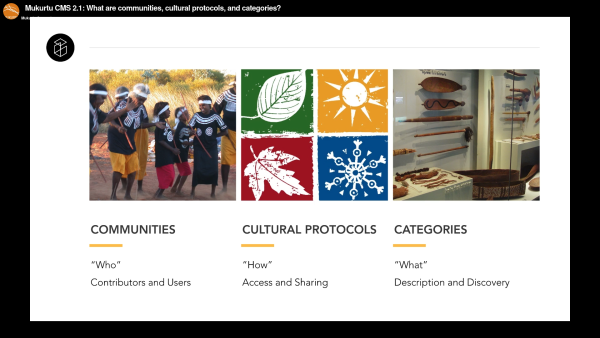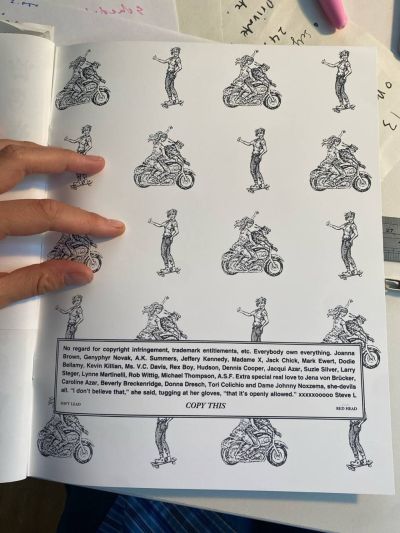Practice Documents
Ecologies of Dissemination: Practice Documents
In this section, we have brought together a set of documents that we have found helpful for navigating practices of reuse. They range from legal contracts to manifestos, from manuals to codes of conduct. Making the conditions of reuse explicit, they can be applied and adjusted to different contexts and needs. The collection includes conditional free licences, research agreements, protocols for cross-cultural sharing, and “commitments”. Most of the documents are published under Open Content licences, so you are welcome to download, copy, distribute, and rework them.
CC4r
Collective Conditions for reuse (CC4r) is a collectively written document that can be included in any publication as a way to reorient conventional copyright. For more context, see project nodes.
→ https://constantvzw.org/wefts/cc4r.en.html
Conditions for reuse: CC4r
The Nonviolent Public Licence v7
This licence is part of a group of ‘ethical licences’ that have appeared since 2018. Together with projects such as the Do No Harm Licence, the Hippocratic Licence or the Anti-996 Licence, such ethical licences experiment with Open Content licensing as a tool to control who can or cannot reuse content that Open Source communities produce, and for what purpose. The Nonviolent Public Licence is one of the more verbose projects of the group and included here because it is meant to cover all kinds of content, including cultural production.
→ https://thufie.lain.haus/NPL.html
Conditions for reuse: "You may do as you please with this license, copy, modify, and redistribute it. The only restriction is that you change the name of the resultant work if modifications were made including changing the Uniform Resource Identifier of the work."
Mukurtu: communities, cultural protocols, and categories
Mukurtu is a content management system "aiming to empower communities to manage, share, narrate, and exchange their digital heritage in culturally relevant and ethically-minded ways." The software is released under a Free, Libre and Open Source license and can be used to grow online community repositories for digital or digitised cultural materials and knowledge that grow from continued use, dialogue and negotiations. One way Mukurtu proposes to do that, is to insist that all materials should be published with information on "who" (which communities contributes, who is reusing the material), "how" (protocols for reuse) and "what" (how did the material arrive).
Conditions for reuse: GNU General Public License version 3 (GPLv3) - https://www.gnu.org/licenses/quick-guide-gplv3.html
Copy far AI license
This is an interesting proposal because it functions more as an add-on than a complete license and addresses the problems with reuse in Artificial Intelligence applications. It was created to supply the absence of specific licenses that restricts ingestion of content by LLMs and image classifiers. It can be plugged into any existing license.
→ https://copyfarai.itcouldbewor.se/
Conditions for reuse: Creative Commons Attribution 4.0 International License (CC BY 4.0) - https://creativecommons.org/licenses/by/4.0/
COPY THIS
G.B. Jones, according to Kunstverein Toronto who republished the publication in 2022, "was originally published in New York in 1994 by Feature and Instituting Contemporary Idea. In 1995, copies sent to Canada were confiscated by customs officials. All seized copies were burned." The colophon page in the back of the book reads as follows: No regard for copyright infringement, trademark entitlements etc. Everyone own everything (... a long list of names), SOFT LEAD COPY THIS RED HEAD".
Conditions for reuse: COPY THIS
Editorial note
An editors' note had been added to the e-book version of Lost Libraries, Burnt Archives, edited by Sindi-Leigh McBride & Julia Rensing on page 9. The note articulates the regret and grief about the missed opportunity to acknowledge and cite the influences that inspired the book. The note is also understood to instigate a shared reflection on this oversight. See also prompt Spaces for discomfort - Recognition.
Conditions for reuse: undefined
Protest Font
Before inviting visitors to download posters and fonts, Be Oakly spells it out:
'These fonts may be used by queer, trans and non-binary folks, black and indigenous folks for commercial uses for personal for-profit projects, non-profit organizations and mutual aid fundraisers. If you are able please consider making a donations via our PayPal account at genderfailproject@gmail.com. If you are a large for-profit business or corporations don’t you fucking dare download or use these fonts.'
→ https://genderfailpress.info/PROTEST-FONTS
Conditions for reuse: See above?
Bewitching technologies copyright license
Dilan U+16DE adapted the Anti-Capitalist Software license (ACSL) to clarify that reuse is granted for 'individuals and organizations that do not operate by capitalist, colonial and/or fascist principles.'
→ https://bewitchingtechnologies.link/assets/txt/Bewitching_Technologies_Copyright_License.txt
Conditions for reuse: The ACSL mentions that it "was built in response to, and out of, other licenses. We fully encourage you to adapt, expand, or edit the language of the ACSL to meet the needs of your project, or to use it as a starting place for something new. There is also a list of licenses with similar directives at the bottom of this page, which might provide exactly what you need."
Self-Review of Citational Practice
Self-Review of Citational Practice was formulated by Angela Okune in 2019 as a short list of questions that she suggests to ask ourselves, before publishing a text or other work. It is clearly situated in scholarly practice, but invites reflection and consideration of reuse in other practices as well.
Conditions for reuse: Attribution-NonCommercial-ShareAlike (CC BY-NC-SA). Cite as: Angela Okune, "Okune, Angela. (2019, May 21). Self-Review of Citational Practice. Zenodo.", contributed by Angela Okune, Research Data Share, Platform for Experimental Collaborative Ethnography, last modified 8 October 2020, accessed 21 August 2024. https://www.researchdatashare.org/content/okune-angela-2019-may-21-self-review-citational-practice-zenodo
Rewrite of Self-Review of Citational practice (version 1 and 2)
The Self-Review of Citational Practice was one of the ingredients of an on-line reading session organised as part of Ecologies of dissemination. Despite feeling discomfort with rewriting Okune's work, participants decided to rephrase some of her questions to reflect their different approach to reuse, teasing out the situated assumptions in Okune's proposal in the process. The collaborative online document ends with "we're moving within her framweowrk -- it is a loop".
→ Rewrite of Self-Review of Citational practice.txt
Conditions for reuse: undefined
Traditional Knowledge Research Guidelines
Community research contracts and guidelines, often developed within Indigenous knowledge contexts, aim to ensure ethical reuse of (Traditional) knowledges.
This sample document offers careful reflection of ethical processes of reuse of Traditional Knowledges (TK). While it has been developed for researchers in the Yukon, Northern Canada, the document might also be helpful for other contexts. It reflects the outcome of a series of work sessions and committee meetings convened by the Council of Yukon First Nations, the Northern Contaminants Program in 1998/99 with community members, government agencies and researchers to discuss the ways and means of developing protocols for ethical access and responsible use of traditional knowledge. It contains the documentation of the process next to a set of helpful appendices, forms and templates.
Traditional Knowledge Research Guidelines (CYFN) August 2000 https://ethicshub.ca/wp-content/uploads/2020/05/41-Sample-Community-Research-Agreement.pdf
Conditions for reuse: Creative Commons Attribution-NonCommercial-ShareAlike 4.0 International License.
Engaging typographic conditions for use (CUTE)
CUTE, "Conditions d'utilisations typographiques engageantes" (Engaging typographic conditions for use) were developed between 2022 and 2024 by Bye Bye Binary. The Franco-Belgian collective is invested in proliferating a specific post-binary typographic practice. The CUTE stipulates under which conditions the fonts can be used and modified and brings up two important issues. These conditions ask users and re-users to take into account their own economic situation and financially support the typographic practice of those that release the fonts.
→ https://genderfluid.space/documents/2024_BBB_CUTE-EN.pdf
Conditions for reuse: CC4r
Protocol for respectful guests
One example that serves as inspiring case for setting the conditions for reuse is As I Remember It Teachings (Ɂəms tɑɁɑw) from the Life of a Sliammon Elder (2018), an open access digital publication sharing the teachings of the Sliammon (ɬaʔamɩn) elder and knowledge keeper Elsie Paul.
The interactive multi-media online publication, a non-linear account of Sliammon knowledge and teachings opens with a pop-up notice ‘Protocol for Being a Respectful Guest’. After a short introduction, the readers get notified that they enter a webspace which operates according to an indigenous protocol that stipulates the conditions under which the website and its contents can be accessed and used. It lays out the procedure and mutual obligations, similar to a code of conduct. Interestingly, the notice states that the materials shared on the website are not simply ‘content or information, rather they are our belongings, the intellectual property of myself or the ɬaʔamɩn people’.
Even if the ‘Protocol for Being a Respectful Guest’ touches upon intellectual property, the ɬaʔamɩn consider content, such as the shared knowledges and teachings, to belong rather than to be owned. The use of the term belonging shifts agency away from the makers of the stories (photos, videos, and language on the website) to the content itself. By making this shift, guests can be invited to develop a relation and sense of belonging to the shared knowledges.
→ https://publications.ravenspacepublishing.org/as-i-remember-it/protocol-for-being-a-respectful-guest
Conditions for reuse: undefined
Collaboration agreement
The Brussels' design caravan OSP developed this Collaboration Agreement as a way to open a discussion about collective work, shared authorship and collaborative methods before the start of a process. We included this document because it situates practices of reuse in a larger ecology of practices.
→ https://collaboration.osp.kitchen/
Conditions for reuse: CC4r
Omissum
'Omissum is a term invented in a meeting that took place in Brussels in October 2019. It describes what we felt needed to happen in response to the omissions in our work with/around Otlet and our silence about how racism is part of his oeuvre. The term ‘erratum’ was proposed at first, but we realised we needed a different way to talk about what was being missed out on. Rather than using a word that would suggest an isolated mistake that needs to be corrected, we consider this problem to be a systemic issue that we need to engage with; it is a process.'
→ https://diversions.constantvzw.org/paul-otlet-an-omissum.html
Conditions for reuse: 'We invite you to adapt and rewrite this omissum and insert it into other publications that might need it.'


